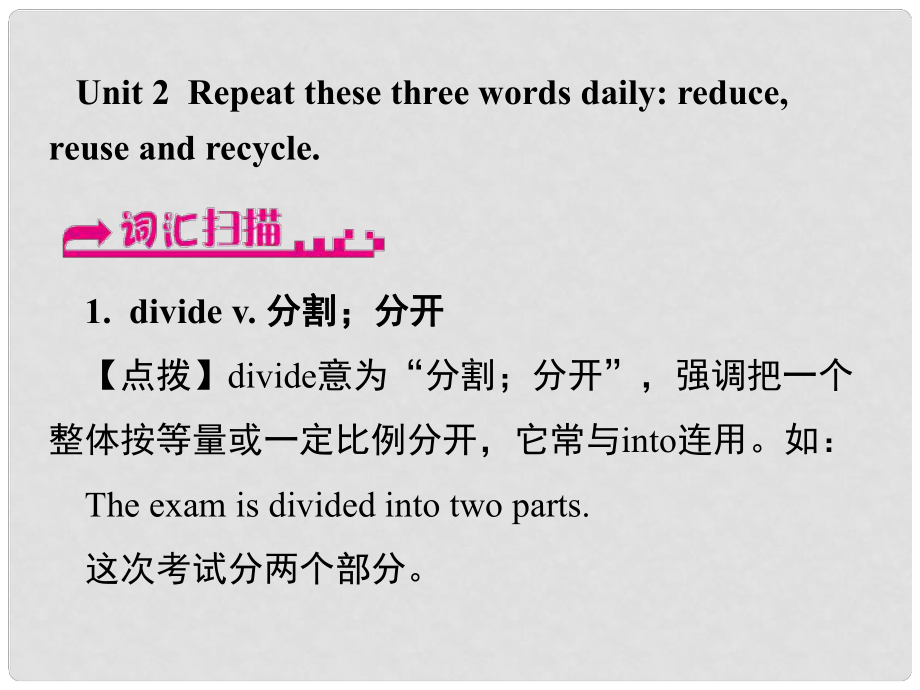《浙江省嘉興市秀洲區(qū)九年級英語上冊 Module 12 Unit 2 Repeat these three words daily reducereuse and recycle課件 (新版)外研版》由會員分享�,可在線閱讀,更多相關(guān)《浙江省嘉興市秀洲區(qū)九年級英語上冊 Module 12 Unit 2 Repeat these three words daily reducereuse and recycle課件 (新版)外研版(18頁珍藏版)》請在裝配圖網(wǎng)上搜索。
1�����、Unit 2 Repeat these three words daily: reduce, reuse and recycle. 1. divide v. 分割�����;分開分割����;分開 【點撥】divide意為“分割����;分開”,強調(diào)把一個整體按等量或一定比例分開�,它常與into連用。如: The exam is divided into two parts. 這次考試分兩個部分����。 【延伸】separate也意為“分開”,但側(cè)重表示把原來在一起或靠近的事物分隔開來�,分開后的部分具有相對的獨立性,常與介詞from連用�。如: The children are separating the good appl
2、es from the bad ones. 孩子們正在把好蘋果與爛蘋果分開。2. fast, quick與與rapid 【辨析】(1)fast側(cè)重指速度方面����,表示速度快或鐘表走得快等的時候,通常用fast����。如: She ran as fast as she could 她有多快就跑多快。 (2)quick表示某一動作來得突然��,有時還含有“匆忙”之意(但通常不指動作的頻率)�。催人快做、快走等通常用quick�����。其副詞形式是quickly�����。如: She ate a quick breakfast and rushed off to work 她匆匆吃了早餐就去上班了����。 (3)rapid常指突然或急速
3、(且連續(xù)不斷)的動作�����。另外,rapid還有一種特殊的用法�����,指一種有益的高速度��。如: He asked questions in rapid succession. 他連珠炮似地發(fā)問��。 He made rapid progress in English. 他在英語方面取得了快速的進步��。3. harmful adj. 有害的有害的 【點撥】harmful作形容詞���,意為“有害的”。其常用搭配:be harmful to�,意為“對有害的”。如: But too much sunlight can be harmful. 但是過多的陽光是有害的���。 【延伸】(1)harmful的名詞形式為harm��,意為“
4�、傷害”�����。其常用搭配:do harm to,意為“對有害”�。如: If you do harm to the old man, I shall not look over you. 如果你對這個老人使壞,我可不饒恕你���。 (2)harm也可以作動詞����,意為“傷害”���。如: There was a traffic accident in this street, but no one was harmed. 這條街上發(fā)生了交通事故��,但沒有人受傷�����。4. healthy adj. 健康的健康的 【點撥】healthy作形容詞����,意為“健康的”��。其比較級為healthier�,意為“更健康的”�;最高級為healt
5����、hiest,意為“最健康的”�����。如: This book is healthy for you to read. 這本書對你來說是健康的讀物����。 【延伸】(1)healthy的名詞形式為health,意為“健康”�。如: Sitting too long could be harmful to your health. 久坐有害健康�。 (2)healthy的副詞形式為healthily,意為“健康地”�,常用來修飾動詞。如: We should eat and drink healthily. 我們應(yīng)該健康地進行飲食�。 (3)healthy的反義詞為unhealthy,意為“不健康的”���,近義詞為fit
6�、�,意為“健康的”����。 1. It is better to use china cups and cloth bags because they can be used many times. 最好使用陶瓷杯和布袋����,因為它們能被多次使用。最好使用陶瓷杯和布袋����,因為它們能被多次使用。 【點撥】此句句型為:Its better to.�,意為“最好”。如: Its better to plan ahead if you want arrangements to be really efficient. 如果你想讓你的安排更有效��,最好事先做個計劃�����。 【延伸】類似的句型:Its best to.�,意為“最
7、好”����。此句型語氣上比Its better to.更強烈。如: Its best for us to learn a foreign language, such as English. 我們最好是學一門外語�,例如英語���。 2. Repair them if possible 如果可能就維修它們。如果可能就維修它們���。 【點撥】if possible為if it is possible的省略形式���,意為“如果可能的話”。如: If possible, try to guess the answer. 如果可能�,盡力猜出答案。 【延伸】常見的if引導的省略形式還有: if necessary如果需要的話
8��、 if not如果不這樣的話 if so如果那樣的話 3. It is wasteful to throw so much food away. 扔掉這么多的食物是浪費的�����。扔掉這么多的食物是浪費的�����。 【點撥】(1)Its wasteful to do sth.意為“做某事是浪費的”��。如: Its wasteful to sleep with the light on. 開燈睡覺是浪費的�����。 (2)throw away是動副短語�����,意為“扔掉”����,后接名詞作賓語時,名詞放在away之前或之后均可�,但后接代詞作賓語時,代詞必須放在throw和away中間����。如: What a waste to throw
9、 it away! 扔掉它真是浪費了�����! 4. To keep the flowers growing, you need to water them once a day 為了讓這些花生長�����,你需要每天給它們澆一次水�����。為了讓這些花生長,你需要每天給它們澆一次水���。 【點撥】(1)To keep the flowers growing是不定式短語���,在這里作目的狀語。 (2)need在本句中作實義動詞����,其常見搭配如下: 1)sb need(s) to do sth意為“某人需要做某事”。如: You need to finish your homework. 你需要完成你的作業(yè)���。 2)sth need
10�����、(s) doing意為“某物需要被(主動形式表示被動含義)”����。如: The bike needs repairing. 這輛自行車需要修理��。 5. Dont tell me I shouldnt travel by plane any more. 不要告訴我我再也不能乘飛機旅行了���。不要告訴我我再也不能乘飛機旅行了��。 【點撥】(1)該句是主從復(fù)合句���,主句是祈使句的否定式,從句是省略了that的賓語從句�����。 (2)not.any more相當于no more��,指“(數(shù)量上或程度上)不再(增加)”����,指動作發(fā)生的次數(shù)不再繼續(xù)增加,常與瞬間動詞連用��。如: I have no more money to give you. 我沒有更多的錢給你���。 The baby watched and listened, and she didnt cry any more. 那個嬰兒看著����、聽著����,不再哭了��。
 浙江省嘉興市秀洲區(qū)九年級英語上冊 Module 12 Unit 2 Repeat these three words daily reducereuse and recycle課件 (新版)外研版
浙江省嘉興市秀洲區(qū)九年級英語上冊 Module 12 Unit 2 Repeat these three words daily reducereuse and recycle課件 (新版)外研版

